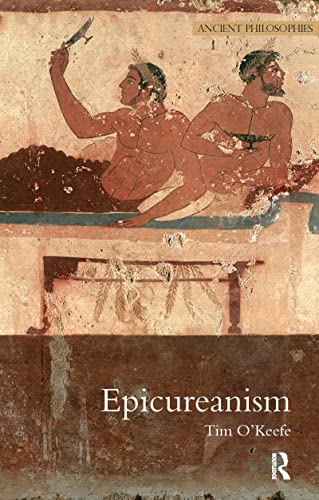Items related to Epicureanism (Ancient Philosophies)

Synopsis
The Epicurean school of philosophy was one of the dominant philosophies of the Hellenistic period. Founded by Epicurus of Samos (century 341-270 BCE), it was characterized by an empiricist epistemology and a hedonistic ethics. This new introduction to Epicurus offers readers clear exposition of the central tenets of Epicurus' philosophy, with particular stress placed on those features that have enduring philosophical interest and where parallels can be drawn with debates in contemporary analytic philosophy. Part 1 of the book examines the fundamentals of Epicurus' metaphysics, including atoms and the void, emergent and sensible properties, cosmology, mechanistic biology, the nature and functioning of the mind, death, and freedom of action. Part 2 explores Epicurus' epistemology, including his arguments against scepticism and his ideas on sensations, preconceptions and feelings. The final part deals with Epicurus' ethics, exploring his arguments for hedonism, his distinctive conceptions of types of pleasure and desire, his belief in virtue, his notions of justice, friendship and his theology. O'Keefe provides extended exegesis of the arguments supporting Epicurus' positions, indicating their strengths and weaknesses, while showing the connections between the various parts of his philosophy and how Epicureanism hangs together as a whole.
"synopsis" may belong to another edition of this title.
About the Author
Tim O'Keefe is Associate Professor of Philosophy at Georgia State University, USA.
"About this title" may belong to another edition of this title.
£ 12.94 shipping from United Kingdom to U.S.A.
Destination, rates & speedsSearch results for Epicureanism (Ancient Philosophies)
Ancient Philosophies: Epicureanism
Seller: Anybook.com, Lincoln, United Kingdom
Condition: Fair. This is an ex-library book and may have the usual library/used-book markings inside.This book has soft covers. Book contains pencil markings. In fair condition, suitable as a study copy. Please note the Image in this listing is a stock photo and may not match the covers of the actual item,400grams, ISBN:9781844651702. Seller Inventory # 5775988
Quantity: 1 available
Epicureanism
Seller: Books Puddle, New York, NY, U.S.A.
Condition: New. pp. 256. Seller Inventory # 264516158
Quantity: 4 available
Epicureanism
Seller: Majestic Books, Hounslow, United Kingdom
Condition: New. pp. 256. Seller Inventory # 3364577
Quantity: 3 available
Epicureanism (Ancient Philosophies)
Seller: Solr Books, Lincolnwood, IL, U.S.A.
Condition: very_good. This books is in Very good condition. There may be a few flaws like shelf wear and some light wear. Seller Inventory # BCV.1844651703.VG
Quantity: 1 available
Epicureanism
Seller: Biblios, Frankfurt am main, HESSE, Germany
Condition: New. PRINT ON DEMAND pp. 256. Seller Inventory # 184516148
Quantity: 4 available
Epicureanism
Seller: THE SAINT BOOKSTORE, Southport, United Kingdom
Paperback / softback. Condition: New. New copy - Usually dispatched within 4 working days. 326. Seller Inventory # B9781844651702
Quantity: 1 available
Epicureanism
Seller: BuchWeltWeit Ludwig Meier e.K., Bergisch Gladbach, Germany
Taschenbuch. Condition: Neu. This item is printed on demand - it takes 3-4 days longer - Neuware -The Epicurean school of philosophy was one of the dominant philosophies of the Hellenistic period. Founded by Epicurus of Samos (century 341-270 BCE), it was characterized by an empiricist epistemology and a hedonistic ethics. This new introduction to Epicurus offers readers clear exposition of the central tenets of Epicurus' philosophy, with particular stress placed on those features that have enduring philosophical interest and where parallels can be drawn with debates in contemporary analytic philosophy. Part 1 of the book examines the fundamentals of Epicurus' metaphysics, including atoms and the void, emergent and sensible properties, cosmology, mechanistic biology, the nature and functioning of the mind, death, and freedom of action. Part 2 explores Epicurus' epistemology, including his arguments against scepticism and his ideas on sensations, preconceptions and feelings. The final part deals with Epicurus' ethics, exploring his arguments for hedonism, his distinctive conceptions of types of pleasure and desire, his belief in virtue, his notions of justice, friendship and his theology. O'Keefe provides extended exegesis of the arguments supporting Epicurus' positions, indicating their strengths and weaknesses, while showing the connections between the various parts of his philosophy and how Epicureanism hangs together as a whole. 224 pp. Englisch. Seller Inventory # 9781844651702
Quantity: 2 available
Epicureanism
Seller: Revaluation Books, Exeter, United Kingdom
Paperback. Condition: Brand New. 256 pages. 8.25x5.50x0.75 inches. In Stock. Seller Inventory # zk1844651703
Quantity: 1 available
Epicureanism
Print on DemandSeller: moluna, Greven, Germany
Condition: New. Dieser Artikel ist ein Print on Demand Artikel und wird nach Ihrer Bestellung fuer Sie gedruckt. Tim O Keefe is Associate Professor of Philosophy at Georgia State University, USA.The Epicurean school of philosophy was one of the dominant philosophies of the Hellenistic period. Founded by Epicurus of Samos (century 341-270 BCE), it was characterized. Seller Inventory # 388382524
Quantity: Over 20 available
Epicureanism
Seller: AHA-BUCH GmbH, Einbeck, Germany
Taschenbuch. Condition: Neu. nach der Bestellung gedruckt Neuware - Printed after ordering - The Epicurean school of philosophy was one of the dominant philosophies of the Hellenistic period. Founded by Epicurus of Samos (century 341-270 BCE), it was characterized by an empiricist epistemology and a hedonistic ethics. This new introduction to Epicurus offers readers clear exposition of the central tenets of Epicurus' philosophy, with particular stress placed on those features that have enduring philosophical interest and where parallels can be drawn with debates in contemporary analytic philosophy. Part 1 of the book examines the fundamentals of Epicurus' metaphysics, including atoms and the void, emergent and sensible properties, cosmology, mechanistic biology, the nature and functioning of the mind, death, and freedom of action. Part 2 explores Epicurus' epistemology, including his arguments against scepticism and his ideas on sensations, preconceptions and feelings. The final part deals with Epicurus' ethics, exploring his arguments for hedonism, his distinctive conceptions of types of pleasure and desire, his belief in virtue, his notions of justice, friendship and his theology. O'Keefe provides extended exegesis of the arguments supporting Epicurus' positions, indicating their strengths and weaknesses, while showing the connections between the various parts of his philosophy and how Epicureanism hangs together as a whole. Seller Inventory # 9781844651702
Quantity: 1 available

